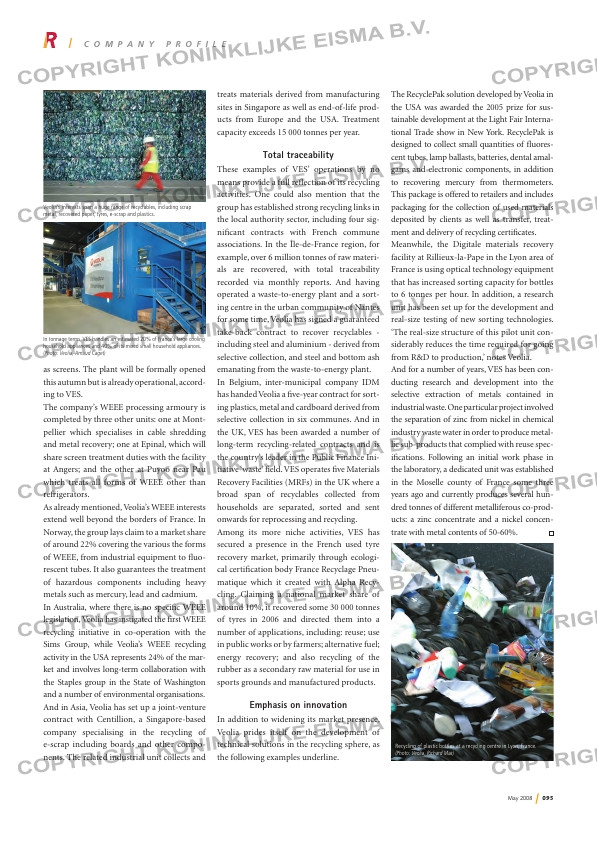Page 95 from: May 2008

The RecyclePak solution developed by Veolia in
the USA was awarded the 2005 prize for sus-
tainable development at the Light Fair Interna-
tional Trade show in New York. RecyclePak is
designed to collect small quantities of fluores-
cent tubes, lamp ballasts, batteries, dental amal-
gams and electronic components, in addition
to recovering mercury from thermometers.
This package is offered to retailers and includes
packaging for the collection of used materials
deposited by clients as well as transfer, treat-
ment and delivery of recycling certificates.
Meanwhile, the Digitale materials recovery
facility at Rillieux-la-Pape in the Lyon area of
France is using optical technology equipment
that has increased sorting capacity for bottles
to 6 tonnes per hour. In addition, a research
unit has been set up for the development and
real-size testing of new sorting technologies.
‘The real-size structure of this pilot unit con-
siderably reduces the time required for going
from R&D to production,’ notes Veolia.
And for a number of years, VES has been con-
ducting research and development into the
selective extraction of metals contained in
industrial waste. One particular project involved
the separation of zinc from nickel in chemical
industry waste water in order to produce metal-
lic sub-products that complied with reuse spec-
ifications. Following an initial work phase in
the laboratory, a dedicated unit was established
in the Moselle county of France some three
years ago and currently produces several hun-
dred tonnes of different metalliferous co-prod-
ucts: a zinc concentrate and a nickel concen-
trate with metal contents of 50-60%.
May 2008 095
C o m p a n y p r o f i l e
as screens. The plant will be formally opened
this autumn but is already operational, accord-
ing to VES.
The company’s WEEE processing armoury is
completed by three other units: one at Mont-
pellier which specialises in cable shredding
and metal recovery; one at Epinal, which will
share screen treatment duties with the facility
at Angers; and the other at Puyoo near Pau
which treats all forms of WEEE other than
refrigerators.
As already mentioned, Veolia’s WEEE interests
extend well beyond the borders of France. In
Norway, the group lays claim to a market share
of around 22% covering the various the forms
of WEEE, from industrial equipment to fluo-
rescent tubes. It also guarantees the treatment
of hazardous components including heavy
metals such as mercury, lead and cadmium.
In Australia, where there is no specific WEEE
legislation, Veolia has instigated the first WEEE
recycling initiative in co-operation with the
Sims Group, while Veolia’s WEEE recycling
activity in the USA represents 24% of the mar-
ket and involves long-term collaboration with
the Staples group in the State of Washington
and a number of environmental organisations.
And in Asia, Veolia has set up a joint-venture
contract with Centillion, a Singapore-based
company specialising in the recycling of
e-scrap including boards and other compo-
nents. The related industrial unit collects and
treats materials derived from manufacturing
sites in Singapore as well as end-of-life prod-
ucts from Europe and the USA. Treatment
capacity exceeds 15 000 tonnes per year.
Total traceability
These examples of VES’ operations by no
means provide a full reflection of its recycling
activities. One could also mention that the
group has established strong recycling links in
the local authority sector, including four sig-
nificant contracts with French commune
associations. In the Île-de-France region, for
example, over 6 million tonnes of raw materi-
als are recovered, with total traceability
recorded via monthly reports. And having
operated a waste-to-energy plant and a sort-
ing centre in the urban community of Nantes
for some time, Veolia has signed a guaranteed
take-back contract to recover recyclables –
including steel and aluminium – derived from
selective collection, and steel and bottom ash
emanating from the waste-to-energy plant.
In Belgium, inter-municipal company IDM
has handed Veolia a five-year contract for sort-
ing plastics, metal and cardboard derived from
selective collection in six communes. And in
the UK, VES has been awarded a number of
long-term recycling-related contracts and is
the country’s leader in the Public Finance Ini-
tiative ‘waste’ field. VES operates five Materials
Recovery Facilities (MRFs) in the UK where a
broad span of recyclables collected from
households are separated, sorted and sent
onwards for reprocessing and recycling.
Among its more niche activities, VES has
secured a presence in the French used tyre
recovery market, primarily through ecologi-
cal certification body France Recyclage Pneu-
matique which it created with Alpha Recy-
cling. Claiming a national market share of
around 10%, it recovered some 30 000 tonnes
of tyres in 2006 and directed them into a
number of applications, including: reuse; use
in public works or by farmers; alternative fuel;
energy recovery; and also recycling of the
rubber as a secondary raw material for use in
sports grounds and manufactured products.
Emphasis on innovation
In addition to widening its market presence,
Veolia prides itself on the development of
technical solutions in the recycling sphere, as
the following examples underline.
Veolia’s interests span a huge range of recyclables, including scrap
metal, recovered paper, tyres, e-scrap and plastics.
In tonnage terms, VES handles an estimated 20% of France’s large cooling
household appliances and 40% of its mixed small household appliances.
(Photo: Veolia, Arnaud Caget)
Recycling of plastic bottles at a recycling centre in Lyon, France.
(Photo: Veolia, Richard Mas)
RI_090_Veolia.indd 5 14-05-2008 14:10:18



